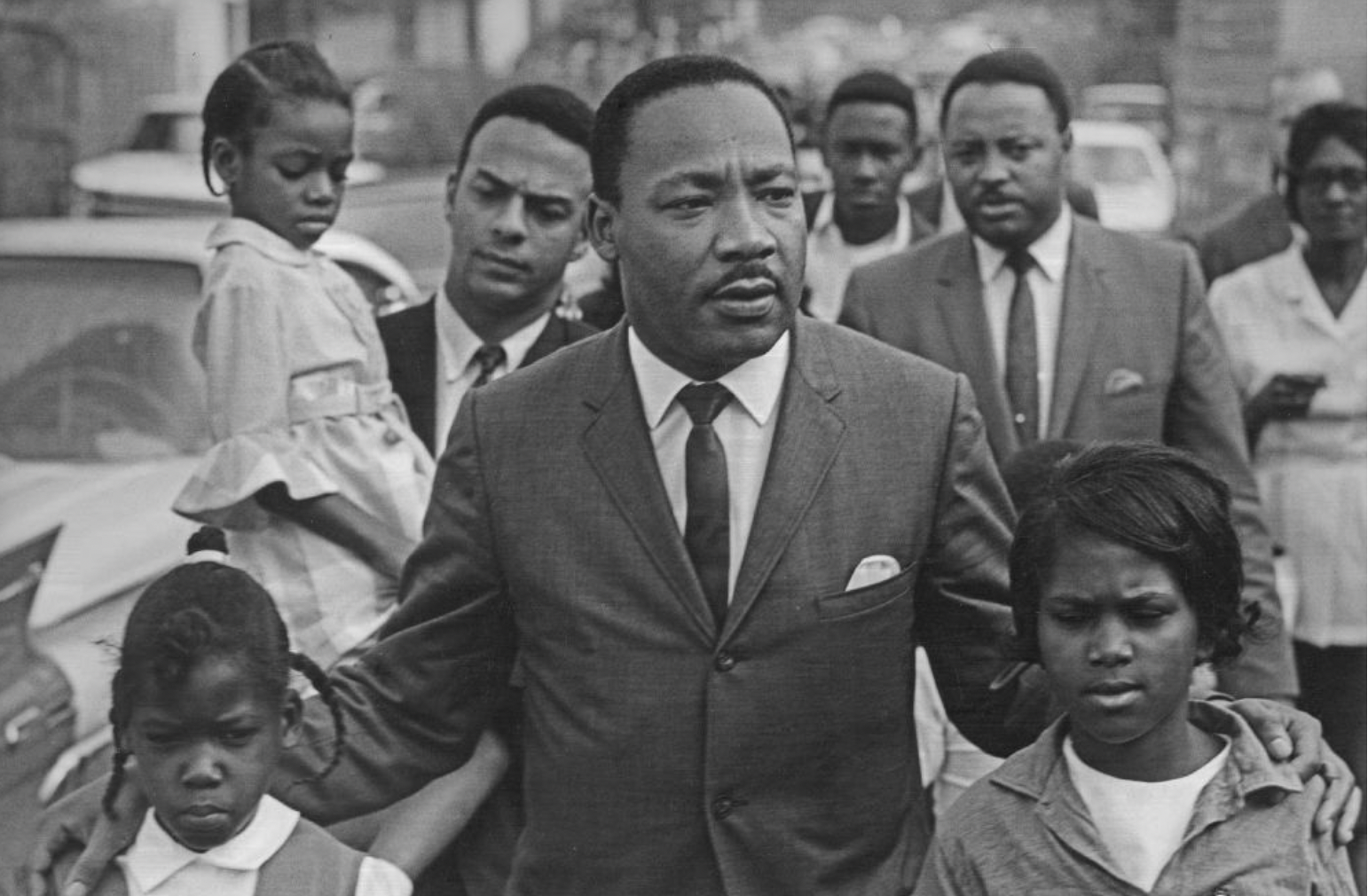Don’t Forget About These Quotes When Celebrating the Work of Dr. Martin Luther King, Jr.
Martin Luther King, Jr. photographed by Marion S. Trikosko, 1964. Source: MLK Online
The Running Industry Diversity Coalition is honoring the legacy of Dr. Martin Luther King Jr. by sharing a list of his quotes we don’t want you to forget!
Far too often, Dr. King has had his identity reduced to a more palatable and less radicalized civil rights activist than who he really was. This results in hearing stories that assume Dr. King believed the Black community is called to take equal responsibility and action as white people who hold power (among other things). In reality, the work Dr. King dedicated his life to was neither generally well-received nor popular.
We aim to offer alternatives to the decontextualized, passive quotes and stories in an effort to more appropriately represent one of the boldest and most influential Black leaders in history. We encourage you to find a way to continue the dialogue around the powerful statements below and create space for the Black community still fighting today against the suppression of their identity by white America.
“Sincerity and conscientiousness in themselves are not enough. Nothing in all the world is more dangerous than sincere ignorance and conscientious stupidity.”
“Love and Forgiveness,” 1964
“White Americans must recognize that justice for black people cannot be achieved without radical changes in the structure of our society.”
“A Testament of Hope” essay, 1969
“Whites, it must frankly be said, are not putting in a similar mass effort to reeducate themselves out of their racial ignorance. It is an aspect of their sense of superiority that the white people of America believe they have so little to learn.
Where Do We Go from Here: Chaos or Community?, 1967
“Loose and easy language about equality, resonant resolutions about brotherhood fall pleasantly on the ear, but for the Negro there is a credibility gap he cannot overlook. He remembers that with each modest advance the white population promptly raises the argument that the Negro has come far enough. Each step forward accents an ever-present tendency to backlash.”
Where Do We Go from Here: Chaos or Community?, 1967
“We know through painful experience that freedom is never voluntarily given by the oppressor; it must be demanded by the oppressed.”
“Letter from a Birmingham Jail,” 1963
“Why is equality so assiduously avoided? Why does white America delude itself, and how does it rationalize the evil it retains?”
Where Do We Go from Here: Chaos or Community?, 1967
“I must say tonight that a riot is the language of the unheard. And what is it America has failed to hear? . . . It has failed to hear that the promises of freedom and justice have not been met. And it has failed to hear that large segments of white society are more concerned about tranquility and the status quo than about justice and humanity."
“The Other America” speech at Grosse Pointe High School, March 14, 1968
“Never again can we afford to live with the narrow, provincial ‘outside agitator’ idea. Anyone who lives inside the United States can never be considered an outsider anywhere within its bounds.”
“Letter from a Birmingham Jail,” 1963
“[I referred] to the creation of tension as a part of the work of the nonviolent resister. This may sound rather shocking. But I must confess that I am not afraid of the word ‘tension.’ I have earnestly worked and preached against violent tension, but there is a type of constructive nonviolent tension that is necessary for growth.”
“Letter from a Birmingham Jail,” 1963
“There must be a recognition on the part of everybody in this nation that America is still a racist country. Now however unpleasant that sounds, it is the truth. And we will never solve the problem of racism until there is a recognition of the fact that racism still stands at the center of so much of our nation and we must see racism for what it is.”
“The Other America” speech at Grosse Pointe High School, March 14, 1968
“For years now I have heard the word ‘Wait!’ It rings in the ear of every Negro with piercing familiarity. This ‘Wait’ has almost always meant ‘Never.’ We must come to see, with one of our distinguished jurists, that ‘justice too long delayed is justice denied.’”
“Letter from a Birmingham Jail,” 1963
“We must rapidly begin the shift from a ‘thing-oriented’ society to a ‘person-oriented’ society. When machines and computers, profit motives and property rights are considered more important than people, the giant triplets of racism, materialism, and militarism are incapable of being conquered.”
“Revolution of Values,” 1967
“One may well ask: ‘How can you advocate breaking some laws and obeying others?” The answer lies in the fact that there are two types of laws: just and unjust. I would be the first to advocate obeying just laws. One has not only a legal but a moral responsibility to obey just laws. Conversely, one has a moral responsibility to disobey unjust laws. I would agree with St. Augustine that ‘an unjust law is no law at all.’”
“Letter from a Birmingham Jail,” 1963
“It may well be that we may have to repent in this generation not merely for the vitriolic words of the bad people who will say bad things in a meeting like this or who will bomb a church in Birmingham, Alabama, but for the appalling silence and indifference of the good people who sit around and say wait on time.”
“The Other America” speech at Grosse Pointe High School, March 14, 1968
“First, I must confess that over the past few years I have been gravely disappointed with the white moderate. I have almost reached the regrettable conclusion that the Negro’s great stumbling block in his stride toward freedom is not the White Citizen’s Counciler or the Ku Klux Klanner, but the white moderate, who is more devoted to ‘order’ than to justice; who prefers a negative peace which is the absence of tension to a positive peace which is the presence of justice; who constantly says: ‘I agree with you in the goal you seek, but I cannot agree with your methods of direct action.’”
“Letter from a Birmingham Jail,” 1963
“Today's expression in Montgomery is the expression of 50,000 people who are tired of being pushed around […] We can't slow up because of our love for democracy and our love for America. Someone should tell Faulkner that the vast majority of the people on this globe are colored.”
Speaking at the Concord Baptist Church in Brooklyn, New York, March 1956
“We must be concerned not merely about who murdered them, but about the system, the way of life, the philosophy which produced the murderers.”
Eulogy for the Martyred Children, 1963
“Now, we got to get this thing right. What is needed is a realization that power without love is reckless and abusive, and that love without power is sentimental and anemic. Power at its best is love implementing the demands of justice, and justice at its best is love correcting everything that stands against love.”
Where Do We Go from Here: Chaos or Community?, 1967
“And the price that the United States must pay for the continued exploitation and oppression of the Negro and other minority groups, is the price of its own destruction.”
The American Dream, 1965
“There is an Old Testament prophecy of the ‘sins of the Fathers being visited upon the third and the fourth generations.’ Nothing could be more applicable to our situation. America is reaping the harvest of hate and shame planted through generations of educational denial, political disfranchisement and economic exploitation of its black population.”
We need an Economic bill of Rights, 1968
(Photo: Bob Fitch Photography Archive, Stanford University Libraries).
To stay engaged year round, here are some additional resources.
Reading:
“4 Misused Martin Luther King Jr Quotes to Look for Today, and Ways to Respond to Them,” January 16, 2017, by Melinda Guerra, Fourth & Sycamore
“A Revolution of Values” speech on the war in Vietnam, April 4, 1967; sourced from Zinn Education Project
“Letter from Birmingham Jail,” written April 16, 1963; sourced from Chico State University, copy of the Atlantic Monthly published August 1963
“Love in Action” I sermon delivered April 3, 1960; sourced from the Stanford Martin Luther King, Jr. Research and Education Institute
“The Other America” speech at Grosse Pointe High School, March 14, 1968; sourced from Grosse Pointe Historical Society
“The Three Evils of Society” address delivered at the National Conference on New Politics August 31, 1967, sourced from the Northwest Educational Service District 189, January 20, 2021
“Where Do We Go from Here Quotes”’ excerpts from Where Do We Go from Here: Chaos or Community? by Martin Luther King Jr. published in 1967; sourced from Goodreads
Organizations Continuing Dr. King’s Legacy:
Dr. Martin Luther King Jr. Association of Westfield
Dr. Martin Luther King, Jr. Task Force, Inc.
Foundation for Black Philanthropy
March on Washington Film Festival
Martin Luther King Jr. Freedom Center
National Civil Rights Museum Corporate Equity Center
National Low Income Housing Coalition
The Philadelphia Martin Luther King, Jr. Association for Nonviolence, Inc.


